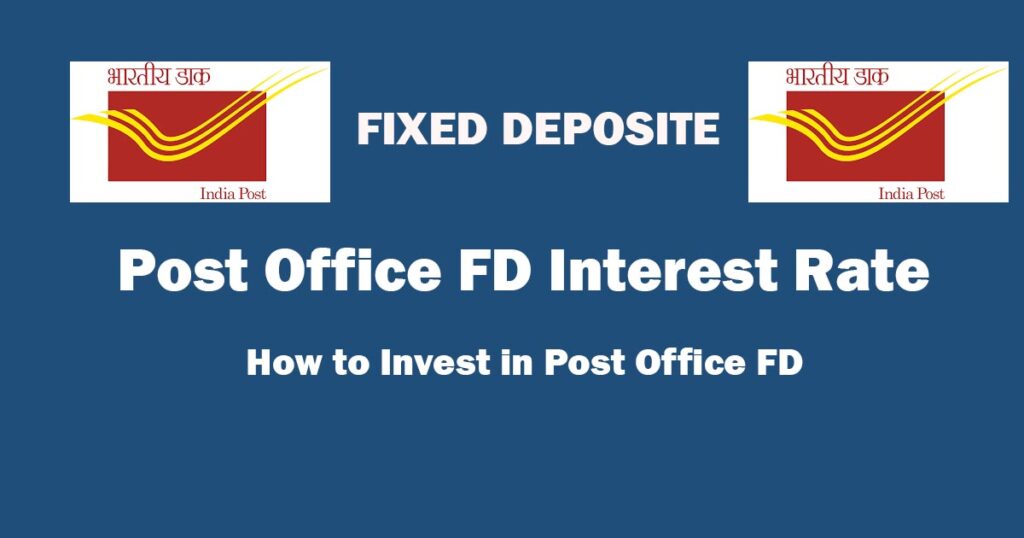Post Office Fixed Deposit (FD) is a popular investment option in India, especially for risk-averse investors. It is a government-backed scheme that offers guaranteed returns and is considered a safe investment option. One of the primary factors that make attractive is the Post Office FD interest rate offered by them.

These interest rates are fixed for the entire tenure of the FD and are compounded annually. The interest earned on the FD is fully taxable, and the tax is deducted at source (TDS) if the interest earned is more than Rs.10,000 in a financial year.
One benefit of investing in a Post Office Fixed Deposit is that the interest rates are greater than those given by most banks. For example, State Bank of India (SBI) offers FD interest rates ranging from 2.9% to 5.4% for terms ranging from 7 days to 10 years. Post Office FDs, on the other hand, provide greater interest rates, making them an appealing investment alternative.
Post Office FD Interest Rate
Another advantage of investing in a Post Office FD is that they are backed by the Government of India. This means that the investment is considered safe and secure, and there is no risk of default.
However, one of the disadvantages of investing in a Post Office FD is that the liquidity is low. Once you have invested in FD, the money is locked in for the entire tenure of the FD. In case of an emergency, the investor cannot withdraw the money before the maturity date without incurring a penalty.
Features of Post Office FD
- Post Office Fixed Deposit (FD) is a government-backed investment scheme that offers a fixed rate of return for a fixed tenure. Here are some of the features of Post Office FD:
- Tenure: The tenure of Post Office FDs ranges from 1 year to 5 years. The investor can choose the tenure that suits their investment goals and needs.
- Interest rate: The interest rate offered by Post Office FDs is fixed for the entire tenure of the investment. The interest rates offered are higher than those offered by most banks, making it an attractive investment option for risk-averse investors.
- Minimum and maximum investment: The minimum investment amount for Post Office FD is Rs. 1,000, and no maximum limit for investment.
- Taxation: The interest earned on Post Office FDs is fully taxable, and the tax is deducted at source (TDS) if the interest earned is more than Rs. 10,000 in a financial year.
- Maturity period: The maturity period of Post Office FDs ranges from 1 year to 5 years. The investment amount, along with the interest earned, is paid back to the investor at the end of the maturity period.
- Nomination facility: The investor can nominate one or more individuals to receive the investment amount in case of the investor’s death.
- Loan against FD: The investor can avail of a loan against the Post Office FD. The loan amount can be up to 75% of the deposit amount, and the interest rate charged on the loan is relatively lower than the interest rate offered on other loans.
- Premature withdrawal: The investor can prematurely withdraw the investment amount before the maturity date, subject to certain conditions. However, in such cases, the interest earned is reduced by a certain percentage.
- Post Office FDs offer a fixed rate of return for a fixed tenure, making them an attractive investment option for risk-averse investors. The interest rates offered are higher than those offered by most banks, and the investment is backed by the government, making it a safe and secure investment option. However, investors must consider the low liquidity and the tax implications before investing in Post Office FDs
Read More:LIC Pension Plan – Features & Benefits
Eligibility for Post Office FD
- Post Office Fixed Deposit (FD) is a popular investment option in India. Here are the eligibility criteria for investing in Post Office FD:
- Indian resident: Only Indian residents are eligible to invest in Post Office FD. Non-resident Indians (NRIs) and Persons of Indian Origin (PIOs) are not eligible to invest in Post Office FD.
- Age: An individual must be at least 18 years of age to invest in Post Office FD. Minors can also invest in Post Office FD with the help of a guardian.
- Documents: The investor must have a valid identity proof such as Aadhaar card, PAN card, Voter ID card, or Passport. They also need to provide their address proof, such as Aadhaar card, electricity bill, or telephone bill.
- Mode of Investment: Investors can invest in Post Office FD in single or joint mode. The joint account can be held with a maximum of three individuals.
- Source of funds: The funds invested in Post Office FD must be from a legitimate source and not from any illegal or criminal activity.
How to Invest in Post Office FD
Here are steps to invest in a Post Office FD:
- Step 1: Visit the nearest post office branch: To invest in a Post Office FD, you need to visit the nearest post office branch. You can find the nearest post office branch on the India Post website.
- Step 2: Fill up the application form: You need to fill up the Post Office FD application form, which is available at the post office branch. The form requires your personal and contact details, investment amount, tenure, and mode of investment (single or joint).
- Step 3: Submit the required documents: You need to submit the required documents, including identity proof, address proof, passport size photograph, nomination form, and KYC form.
- Step 4: Make the payment: You need to make the payment for the investment amount in cash or by cheque.
- Step 5: Get the acknowledgement slip: After submitting the application form and making the payment, you will receive an acknowledgement slip. The slip contains details such as the investment amount, tenure, and interest rate.
- Step 6: Collect the FD certificate: The post office will issue an FD certificate containing details such as the investment amount, tenure, interest rate, and maturity date. You can collect the FD certificate from the post office after a few days.
It’s important to view that the interest rate of Post Office FDs is change from time to time. You can check the latest interest rates on the India Post website or by visiting the nearest post office branch.
Read More: What is IDV in insurance
Documents Required for Post Office Fixed Deposit
To open a Post Office Fixed Deposit (FD), you need to provide certain documents. Here’s a list of documents required to open a Post Office FD:
- Identity proof: You need to provide a valid identity proof, such as a PAN card, Aadhaar card, Voter ID card, Passport, or Driving License.
- Address proof: You need to provide a valid address proof, such as Aadhaar card, Passport, Voter ID card, Driving License, or utility bills like electricity, telephone or gas bill.
- Passport size photograph: You need to provide a recent passport size photograph.
- Nomination form: You need to fill up the nomination form indicating the nominee’s name, address, and relationship with the investor. The nomination is optional but advisable.
- Account opening form: You need to fill up the account opening form with your personal and contact details, investment amount, tenure, and mode of investment.
- KYC (Know Your Customer) form: You need to fill up the KYC form, which includes details such as your name, address, date of birth, occupation, source of income, and contact information.
It’s important to note that the required documents may vary depending on the investment amount and the mode of investment (single or joint). You can visit the nearest post office branch to get more information on the documents required to open a Post Office FD.
you need to provide a valid identity proof, address proof, passport size photograph, nomination form, account opening form, and KYC form to open a Post Office FD. It’s important to ensure that the documents provided are accurate and valid to avoid any delays in the account opening process.
Benefit of Post Office FD
Post Office Fixed Deposit (FD) is a popular investment option in India. Here are some benefits of investing in Post Office FD:
- Guaranteed returns: Post Office FDs offer a fixed rate of return, which is guaranteed for the entire tenure of the investment. This ensures that the investor knows the exact amount of return they will receive at the end of the tenure.
- Safe and secure: Post Office FDs are backed by the Government of India, making them a safe and secure investment option. The investment amount is insured up to Rs. 5 lakhs, making it an ideal investment option for risk-averse investors.
- High-interest rates: The interest rates offered by Post Office FDs are higher than those offered by most banks, making them an attractive investment option. The interest rates are revised periodically, and the latest rates can be obtained from the nearest post office branch.
- Flexible tenure: Post Office FDs offer a flexible tenure ranging from 1 year to 5 years. This allows the investor to choose the tenure that suits their investment goals and needs.
- Nomination facility: Post Office FDs offer a nomination facility, which allows the investor to nominate one or more individuals to receive the investment amount in case of the investor’s death.
- Tax benefits: The investment amount is eligible for tax benefits under Section 80C of the Income Tax Act, 1961. The interest earned, however, is fully taxable, and tax is deducted at source (TDS) if the interest earned is more than Rs. 10,000 in a financial year.
- Loan against FD: The investor can avail of a loan against the Post Office FD. The loan amount can be up to 75% of the deposit amount, and the interest rate charged on the loan is relatively lower than the interest rate offered on other loans.
Read More: How To Close a Credit Card Without Damaging Your Credit Score?
Tax on Post Office FD
Post Office Fixed Deposits (FDs) are considered as a safe and secure investment option in India. However, the interest earned on Post Office FDs is subject to taxation. Here’s what you need to know about the tax on Post Office FD:
- TDS: Tax is deducted at source (TDS) if the interest earned on the Post Office FD is more than Rs. 10,000 in a financial year. The TDS rate is 10% on the interest.
- Taxation of interest earned: The interest earned on Post Office FD is fully taxable as per the income tax slab rate of the investor. The interest earned is added to the income of the investor and taxed accordingly.
- Tax benefits on investment: The investment amount in Post Office FDs is eligible for tax benefits under Section 80C of the Income Tax Act, 1961. The maximum limit for claiming the tax benefit is Rs. 1.5 lakhs in a financial year.
- Taxation of premature withdrawal: If the investor withdraws the Post Office FD prematurely, the interest earned on the FD is taxable as per the income tax slab rate of the investor. However, if the FD is withdrawn due to the death of the investor, the interest earned is tax-free.
It’s important to note that the TDS deducted on the interest earned can be claimed as a tax credit while filing the income tax return. Also, if the investor’s total income is below the taxable limit, they can submit Form 15G/15H to avoid TDS deduction.
Premature Closure of Post Office Fixed Deposit
The Post Office Fixed Deposit (FD) scheme offers the flexibility to the investors to withdraw the deposit amount prematurely, subject to certain conditions. Here are the key points to keep in mind about premature closure of Post Office FD:
Minimum lock-in period: The lock-in period for Post Office FD is 1 year. Premature closure of the FD is not allowed before the completion of 1 year.
Penalty for premature withdrawal: If the investor wishes to withdraw the deposit amount before the maturity date, a penalty will be charged as per the following rules:
If the FD is closed between 1 year and 3 years, a penalty of 1% of the deposit amount will be charged.
If the FD is closed after 3 years, a penalty of 1.5% of the deposit amount will be charged.
Partial withdrawal: Partial withdrawal of the Post Office FD is not allowed. The investor has to withdraw the entire amount in case of premature closure.
Procedure for premature withdrawal: The investor needs to submit a written application to the post office for premature withdrawal of the FD. The application should include details such as the deposit amount, FD account number, and reason for premature closure.
Tax implications: If the FD is withdrawn before the completion of the lock-in period, the interest earned on the FD is taxable as per the investor’s income tax slab rate.
It’s important to note that premature withdrawal of the Post Office FD should be considered as the last resort, as it can result in a penalty and lower returns. In case of any financial emergency, the investor should explore other options such as taking a loan against the FD or using the overdraft facility offered by the post office. It’s advisable to consult a financial advisor before making any decision regarding the premature closure of Post Office FD.
Frequently Asked Questions about Post Office Fixed Deposit
What is the interest rate offered on Post Office FD?
The interest rate on Post Office FD is currently at 5.5% per annum for a tenure of 1 to 5 years.
Is the interest on Post Office FD compounded?
No, the interest on Post Office FD is not compounded. It is calculated on a quarterly basis and paid out annually.
What is the minimum and maximum amount that can be invested in Post Office FD?
The minimum amount that can be invested in Post Office FD is Rs. 1,000, and there is no upper limit.
What is the tenure of Post Office FD?
The tenure of Post Office FD ranges from 1 year to 5 years.
Can I withdraw the interest earned on Post Office FD before maturity?
No, the interest earned on Post Office FD is paid out annually on the maturity date. However, if the investor opts for the monthly interest payout option, the interest earned can be withdrawn on a monthly basis.
Is there any tax on the interest earned on Post Office FD?
Yes, the interest earned on Post Office FD is taxable as per the income tax slab rate of the investor.
Can I take a loan against Post Office FD?
Yes, the investor can take a loan against Post Office FD. The loan amount is limited to 75% of the deposit amount.
Is premature withdrawal of Post Office FD allowed?
Yes, premature withdrawal of Post Office FD is allowed after the completion of the lock-in period of 1 year. However, a penalty is charged for premature withdrawal.
Can I open a Post Office FD online?
No, currently the Post Office FD can be opened only offline by visiting the nearest post office.






